'Long Covid': The economy is also badly out of puff
- Published
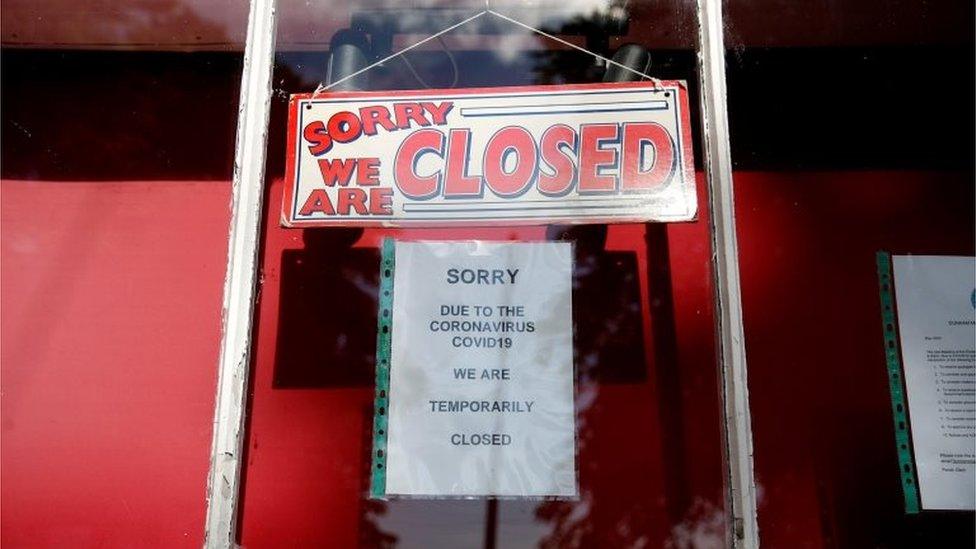
The forecast contraction in the Scottish economy of 10% is in line with the UK, but worse than most other countries.
Paying the bills may continue to weigh on health budgets well beyond this year, say fiscal experts, and we can expect big tax increases by 2025.
Scots support higher taxes to support public services, though it's more a "liberal" preference than "authoritarian".
Scotland's economy is not expected to return to its pre-pandemic levels of output for more than three years, according to a forecast published on Tuesday by the chief economist at the Scottish government.
That's the central forecast, getting back to early 2020 output by the end of 2023. That is seen as following a dip of 9.8% in output being forecast for the whole of this year.
Unemployment is expected to rise from 4.6%, the most recent figure for May to July, to a peak of 8.2% by this December.
Since lockdown was eased, the recovery of some markets and stabilisation of the economy is not seen as being sustained into the fourth quarter of the year. Some others are talking about a fourth quarter contraction, so possibly a double dip recession.
This forecast comes with a warning from Chief Economist Gary Gillespie: with this level of uncertainty, recovery could be much faster or slower. The chart he has set out displays a wide fan of possibilities.
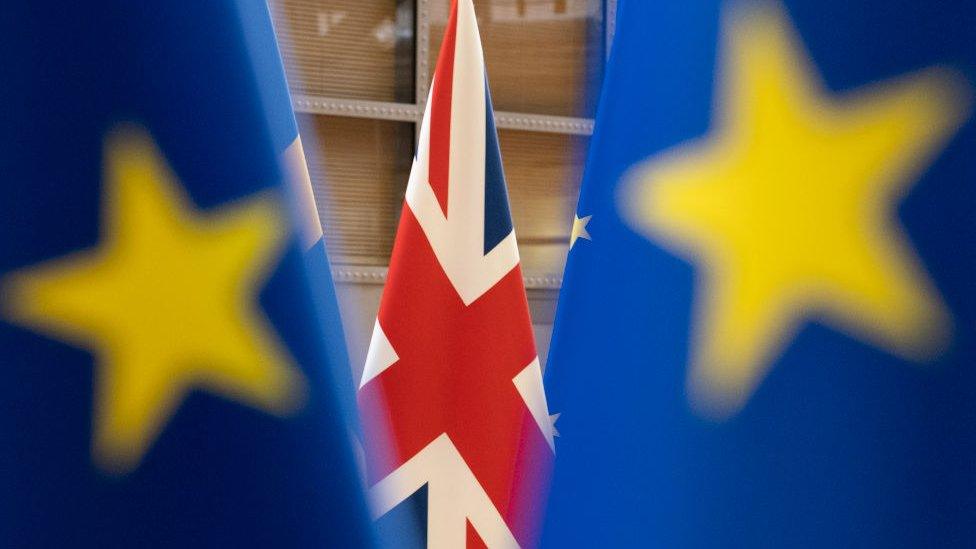
Brexit turbulence
While it's this "central scenario" that takes Scotland back to pre-Covid output in late 2023, the chief economist in St Andrew's House is focussed on the risk of the downside.
Things could be much slower to recover, depending on the imposition of further measures to control infection, with a knock-on effect for the economy.
UK government policy has shifted from the furlough scheme to a less generous subsidy for employers who can pay at least half of a wage, and policy choices like that could push down the path of the recovery.
Dr Gillespie was involved in drawing up a Scottish government alternative plan that would continue furlough until next June, at a cost of £850m, and 61,000 fewer people in the unemployment queue at the start of next year.
Next there's Brexit, which is expected to be a drag on Britain's recovery, but how much is impossible to know when negotiations with the European Union are far from resolved. The Scottish government's forecast assumes the UK government is true to its intentions of striking a departing trade deal, so that it won't be too turbulent a departure from the single market and customs union.
How would a 9.8% contraction in 2020 compare with other forecasts? The Bank of England and the Treasury have forecasts for UK economic output that lie a few notches to either side of that figure: 9.5% and 10%.
The forecast for the world economy, according to the Organisation for Economic Co-operation and Development (OECD), looks like 4.5% contraction, while the International Monetary Fund (IMF) says it might be 4.9% down.
Most economic analysis is agreed that, when compared with most comparable developed nations, the UK is doing relatively badly in economic performance as well as Covid deaths.
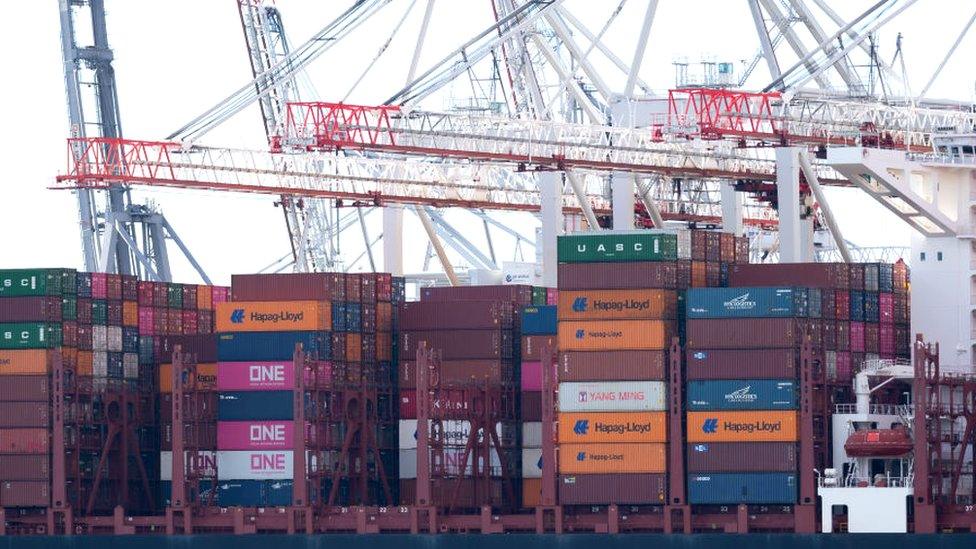
The Scottish government's forecast assumes the UK government is true to its intentions of striking a departing trade deal with the EU
'Global Britain'
Of course, forecasting has a nasty habit of being wrong, particularly when in uncharted territory such as that being traversed in 2020.
The performance of the economy was not as bad as Dr Gillespie forecast last April. He thought it was imploding by 30%, and he had good company for expecting that scale of contraction.
As we're reminded in his State of the Economy report, published on Tuesday, the second quarter of the year showed a contraction of 19.4% - coming in less severely because lockdown was eased earlier than expected and some sectors remained surprisingly resilient.
Included in his report is a review of trade figures, which are not the most reliable data, but worth a reminder that both exports and imports have taken a hit.
In the second quarter, the data tells us overseas sales were down £5.7bn, or 31%, with oil and gas, along with beverages (a trade wonk's word for whisky) down by most.
In the context of Brexit and the hopes of a "Global Britain" connecting with markets beyond Europe, it's interesting to note that exports beyond Europe were much less resilient. They fell twice as fast as those to the European Union.
Digging into survey data from the Office for National Statistics, you can get at least a sense of how imports fared by comparison: while 36% of exporting firms said their numbers were below normal in August and September, that was true of 31% of importing firms.
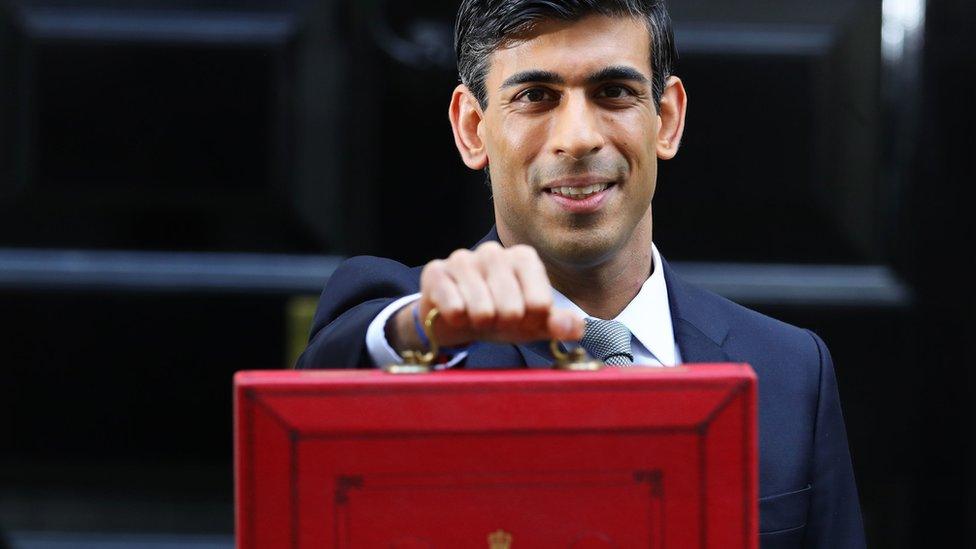
Rishi Sunak's budget has been postponed
Test, Trace and Pay
Much of my working day is taken up with reading more or less dire surveys and analysis of the economy and the business outlook. Stand by for the latest from the Fraser of Allander Institute, being published on Wednesday.
On Tuesday, we got the view of the Institute of Fiscal Studies about the implications of all this for the choices facing the Chancellor, Rishi Sunak, in setting public spending and taxation.
Having postponed a budget from this autumn, due to uncertainty on both sides of the ledger, he may still produce a high-level view of spending priorities by the end of the year. The IFS is recommending he sticks to one year, as the intended three-year spending review would be likely to be (I paraphrase) a work of dystopian fantasy.
The chief concern raised by IFS researcher and author Ben Zaranko is that the health costs of Covid - including Test and Trace, and all that disposable protective equipment - could well linger long after this financial year.
Even if interest rates are low, debt payments will be up, after borrowing more than £300bn this fiscal year. Unemployment will be up, raising the benefits bill.
But even assuming that a quarter of the £70bn extra day-to-day (resource) budget added to NHS spending this year is continued into 2021-22, it could require a devastating cut in non-health budgets, when they have already seen real spending per head fall by a staggering 25% in a decade.
That's unless taxes go up. IFS director Paul Johnson doesn't see that happening next year or possibly the year after, while the priority remains use of borrowing to stabilise the economy. But he told BBC Radio Scotland that significant tax rises should be assumed after the 2024 Westminster election.
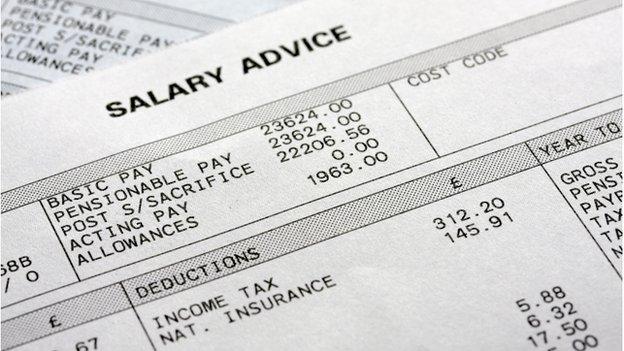
Taxes may rise to pay for health, education and social benefits
Higher taxes?
Decisions such as that have numerous knock-on effects on decisions required at Holyrood, despite (perhaps because of) income tax being devolved. So is there much of an appetite for taxes going up in Scotland?
We got some guide to the mood of the nation, before Covid-19 was A Thing, in the regular survey of Scottish social and political attitudes. It's independently produced and part of it was published on Tuesday as well.
The findings show a gulf between trust in Holyrood to listen and make the right decisions for Scotland, and in Westminster, which lags a long way behind.
On the economy, while a smallish minority believed the economy had strengthened from 2018 to 2019, and that living standards had improved, those people were much more likely to credit the Scottish government than Westminster.
By last year, growing the economy had risen to the top of people's list of priorities, chosen by 23% of people. That was ahead of improving health or education, while the environment and inequality were options seeing the fastest rises.
The appetite for higher taxes, "to pay for health, education and social benefits" (the wording of the survey question can make a big difference) is now well ahead of those who think taxes should stay the same, by 55% to 37%.
That gap was reversed from 2005 to 2015, with '"keep taxes the same" comfortably ahead. Those who want taxes cut, meaning government would "spend less on health, education and social benefits" (see how much the wording of the question matters?) has bobbled along the graph, consistently under the 10% mark.
There's an interesting observation about that from the survey team at ScotCen Social Research. The decline in support for higher taxes to its low point over two decades, around 2009, was clearest among those who wanted Scotland to leave the UK.
However, the subsequent rise in support for higher taxes has not been linked with the independence issue, but with other social and political views. It was people classed as "liberal" who increased their support for higher taxes, but not those with an "authoritarian" outlook.
Asked if government should use taxes to redistribute from the better off to the worse off, 55% agreed and 20% disagreed, predictably split along left-right political lines.
It's possible that those who like the smack of firm authority are also those who anticipate being walloped with those higher tax bills.
- Published29 September 2020

